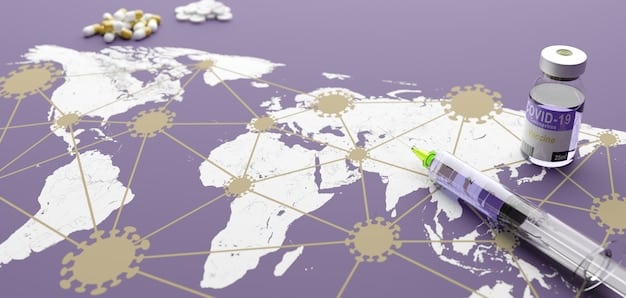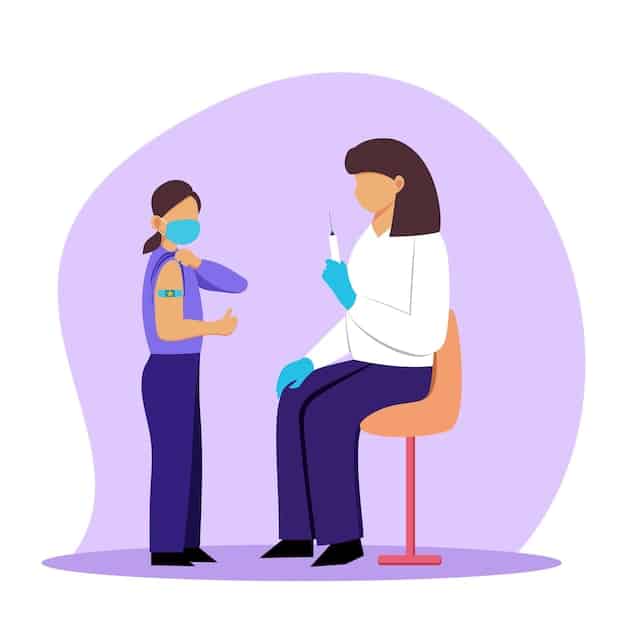How to Protect Yourself from Emerging Infectious Diseases: Prevention and Preparedness

Protecting yourself from emerging infectious diseases involves staying informed, practicing good hygiene, getting vaccinated, boosting your immune system, and following public health guidelines to minimize your risk of infection and spread.
Emerging infectious diseases pose a continuous threat to global health. Knowing how to protect yourself from emerging infectious diseases: a guide to prevention and preparedness is crucial for safeguarding your health and the well-being of your community.
Understanding Emerging Infectious Diseases
Emerging infectious diseases are illnesses that appear in a population for the first time, or those that may have existed previously but are rapidly increasing in incidence or geographic range. These diseases can arise from various sources, including viruses, bacteria, fungi, and parasites, and they often present unique challenges due to their novelty and potential for rapid spread.
Factors such as globalization, climate change, and human encroachment on wildlife habitats contribute to the emergence and spread of these diseases. Understanding these factors is essential to prepare for and mitigate the impact of future outbreaks effectively.

Factors Contributing to the Emergence of Infectious Diseases
Several factors can drive the emergence and spread of infectious diseases. Being aware of these factors helps in understanding the dynamics of disease outbreaks and implementing preventive measures.
- Globalization: Increased travel and trade facilitate the rapid movement of pathogens across borders, making local outbreaks global concerns.
- Climate Change: Alterations in climate patterns can expand the geographic range of disease vectors like mosquitoes and ticks, increasing the risk of transmission.
- Human Encroachment: Deforestation and urbanization bring humans into closer contact with wildlife, increasing the risk of zoonotic diseases (diseases transmitted from animals to humans).
- Antimicrobial Resistance: The overuse of antibiotics has led to the development of resistant bacteria strains, making infections harder to treat.
Understanding these factors helps us recognize the importance of global cooperation, responsible environmental practices, and judicious use of antimicrobials in preventing and controlling emerging infectious diseases.
In conclusion, the emergence of infectious diseases is a complex issue influenced by multiple factors. By understanding the drivers behind these diseases, we can better prepare for and respond to potential outbreaks, protecting ourselves and our communities.
The Importance of Hygiene and Sanitation
Maintaining good hygiene and sanitation practices is a fundamental step in preventing the spread of infectious diseases. Simple habits can significantly reduce the risk of contracting and transmitting illnesses, safeguarding your health and the health of those around you.
These practices form the first line of defense against many common infections and are especially crucial during disease outbreaks. They are easy to implement and can have a profound impact on public health.
Essential Hygiene Practices
Adopting a few key hygiene habits can go a long way in protecting yourself from emerging infectious diseases. These practices are simple, effective, and essential for overall health.
- Handwashing: Wash your hands frequently with soap and water for at least 20 seconds, especially after being in public places, before eating, and after coughing or sneezing.
- Sanitizing Surfaces: Regularly clean and disinfect frequently touched surfaces such as doorknobs, countertops, and electronic devices.
- Respiratory Etiquette: Cover your mouth and nose with a tissue or your elbow when coughing or sneezing, and dispose of tissues properly.
By making these hygiene practices a part of your daily routine, you can significantly reduce the risk of contracting and spreading infectious diseases, contributing to a healthier environment for everyone.
In summary, hygiene and sanitation are pivotal in preventing the spread of infectious diseases. By maintaining clean habits and adhering to proper sanitation practices, individuals can play a significant role in safeguarding their health and the health of their communities.
The Role of Vaccinations
Vaccinations are one of the most effective tools available to prevent infectious diseases. They work by stimulating the body’s immune system to produce antibodies that protect against specific pathogens. Staying up-to-date with recommended vaccines is essential for personal and public health.
Vaccines have significantly reduced the incidence and severity of many infectious diseases, saving countless lives and improving overall quality of life. They are a cornerstone of preventive medicine.

Understanding Vaccine Schedules
Following the recommended vaccine schedules is crucial for ensuring timely protection against infectious diseases. These schedules are designed to provide immunity at the most vulnerable stages of life.
- Childhood Vaccinations: Infants and children should receive vaccines according to the schedules recommended by health organizations like the CDC and WHO to protect them from preventable diseases.
- Adult Vaccinations: Adults also need vaccinations, including annual flu shots and boosters for tetanus, diphtheria, and pertussis (Tdap), as well as vaccines for shingles and pneumonia for older adults.
- Travel Vaccinations: If you’re traveling to certain regions, you may need additional vaccines to protect against diseases prevalent in those areas. Consult with your healthcare provider to determine the necessary vaccinations.
By staying informed about recommended vaccine schedules and adhering to them, you can protect yourself and your community from various infectious diseases. Vaccinations are a safe and effective way to maintain optimal health.
In conclusion, vaccinations play a vital role in preventing and controlling infectious diseases. Staying up-to-date with recommended vaccines is a responsible and effective way to protect yourself and contribute to community immunity, helping to prevent outbreaks and safeguard public health.
Boosting Your Immune System
A strong immune system is your body’s defense against infections. Simple lifestyle changes can help bolster your immunity, making you more resistant to emerging infectious diseases. These changes involve diet, exercise, sleep, and stress management.
A healthy immune system is better equipped to fight off pathogens and recover quickly from illnesses. Taking proactive steps to strengthen your immunity is a long-term investment in your health.
Lifestyle Changes to Strengthen Immunity
Making strategic lifestyle adjustments can significantly impact your immune system’s strength and effectiveness. These changes involve adopting healthy habits across different aspects of your life.
- Balanced Diet: Consume a diverse diet rich in fruits, vegetables, whole grains, and lean proteins to provide essential vitamins and minerals that support immune function.
- Regular Exercise: Engage in moderate physical activity regularly to boost immune cell activity and reduce the risk of chronic diseases that can weaken immunity.
- Adequate Sleep: Prioritize getting 7-8 hours of quality sleep each night to allow your body to repair and regenerate, enhancing immune function.
- Stress Management: Practice stress-reducing techniques such as meditation, yoga, or deep breathing exercises to prevent chronic stress from suppressing immune responses.
By integrating these lifestyle changes into your daily routine, you can significantly strengthen your immune system and enhance your resilience to infectious diseases. These practices support overall well-being and long-term health.
In summary, boosting your immune system through lifestyle changes is essential for preventing and combating infectious diseases. Adopting a balanced diet, exercising regularly, prioritizing sleep, and managing stress can significantly enhance your body’s natural defenses, helping you stay healthy and resilient.
The Importance of Staying Informed
Staying informed about emerging infectious diseases is critical for taking proactive measures to protect yourself and your community. Reliable information helps you understand the risks and adopt effective preventive strategies.
Access to accurate and timely information empowers you to make informed decisions and respond appropriately to potential threats. Reliable sources of information are indispensable in managing emerging infectious diseases.
Reliable Sources of Information
Identifying and relying on credible sources for information is essential for staying informed about emerging infectious diseases. These sources provide accurate, evidence-based updates and guidance.
- World Health Organization (WHO): The WHO provides global updates on disease outbreaks, health guidelines, and preventive measures.
- Centers for Disease Control and Prevention (CDC): The CDC offers information specific to the United States, including disease surveillance, prevention recommendations, and travel advisories.
- Local Health Departments: Local health departments provide information relevant to your specific community, including updates on local outbreaks and vaccination clinics.
By consulting these reliable sources regularly, you can stay informed about emerging infectious diseases and take appropriate steps to protect yourself and your community. Accurate information is your greatest asset in managing potential health threats.
In conclusion, staying informed about emerging infectious diseases through reliable sources is crucial for effective prevention and preparedness. Consult the WHO, CDC, and local health departments regularly to receive accurate, timely updates and guidance, enabling you to take proactive measures and safeguard your health and the health of your community.
Following Public Health Guidelines
Adhering to public health guidelines is a collective effort that plays a critical role in containing the spread of infectious diseases. These guidelines are designed to protect communities by minimizing transmission and promoting overall health.
Public health measures are based on scientific evidence and aim to prevent large-scale outbreaks. Compliance with these guidelines is essential for the well-being of society.
Key Public Health Measures
Several key public health measures are commonly implemented to control the spread of infectious diseases. These measures require cooperation and adherence from individuals and communities.
- Social Distancing: Maintaining physical distance from others reduces the risk of transmission, especially in crowded areas.
- Mask Wearing: Wearing masks in public places, particularly indoors, helps to prevent the spread of respiratory droplets containing pathogens.
- Quarantine and Isolation: Quarantine involves separating individuals who may have been exposed to a disease, while isolation involves separating individuals who are known to be infected.
By diligently following public health guidelines, you contribute to the collective effort to control the spread of infectious diseases and protect vulnerable populations. These measures are essential for community health.
In summary, following public health guidelines is a crucial component of preventing and managing emerging infectious diseases. Adhering to measures such as social distancing, mask wearing, and quarantine/isolation helps to minimize transmission and protect vulnerable populations, contributing to the overall health and safety of the community.
| Key Aspect | Brief Description |
|---|---|
| 🧼 Hygiene | Regular handwashing and sanitation prevent disease spread. |
| 💉 Vaccinations | Vaccines protect by building immunity to specific pathogens. |
| 💪 Immune System | A strong immune system is essential for fighting infections. |
| 📢 Information | Stay informed through WHO, CDC, and local health sources. |
Frequently Asked Questions (FAQ)
▼
Frequent handwashing with soap and water removes germs and prevents the spread of infectious diseases. It’s a simple but effective way to protect yourself and others in your community.
▼
Vaccines stimulate your immune system to produce antibodies that fight specific pathogens, providing immunity. Staying vaccinated protects you by preparing your body against future infections.
▼
Key ways include maintaining a balanced diet, engaging in regular exercise, getting adequate sleep, and managing stress. These habits strengthen your immune system’s ability to fight infections.
▼
Reliable sources include the World Health Organization (WHO), the Centers for Disease Control and Prevention (CDC), and your local health department. These agencies provide accurate updates and guidelines.
▼
Following guidelines like social distancing and mask wearing helps to minimize transmission and protect vulnerable populations. These measures are essential for community health and containing disease spread.
Conclusion
In conclusion, protecting yourself from emerging infectious diseases requires a multifaceted approach. By practicing good hygiene, staying up-to-date with vaccinations, boosting your immune system, staying informed, and following public health guidelines, you can significantly reduce your risk and contribute to community-wide protection.





